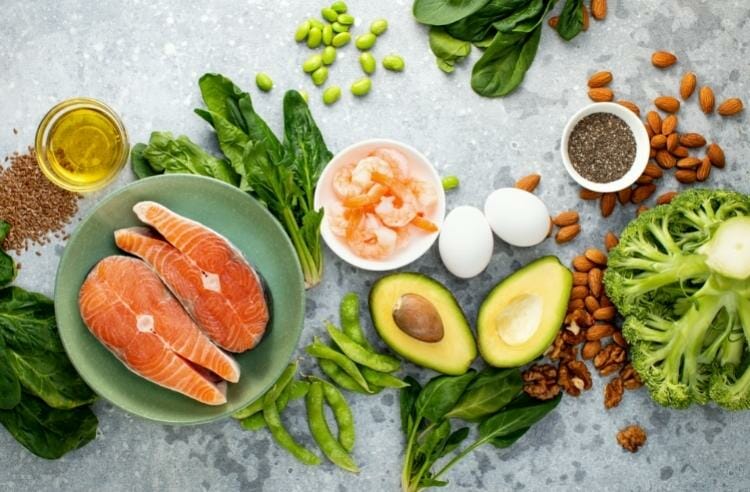
- Functional Food for your Genes
-
by k.mammasis
Let us start by establishing a crucial fact that fats are a necessary part of a balanced diet; especially the so-called good fats. Whatever diet you are adopting, be it vegan, paleo, keto, just to name a few, fat is indeed an important component. Consuming foods for Omega 3 6 9 fatty acids including olive oil, algae, nuts, seeds, avocados, salmon, etc. can have a significant impact on several fundamental bodily processes at a far deeper and molecular level. Did you know that some of the healthiest fats you consume can really lower your cholesterol and cardiovascular disease risk? Read on for further insight and information.
For many Americans, an intake of foods for omega 3 6 9 as part of a nutritionally balanced meal can be a challenging one as most are caught up with the stress of managing work and family. Unknowingly, people are consuming foods that contain high levels of pro-inflammatory oils and ingredients that are hidden within. Poor eating and undernutrition were formerly linked in the United States. Today, it is more frequently linked to excess, especially when it comes to calorie, saturated fat, trans fat, added sugar, and salt excesses 1. High prevalence of obesity, overweight, and diet-related chronic illnesses, such as cardiovascular disease (CVD), hypertension, dyslipidemia, type 2 diabetes, osteoporosis, and some forms of cancer, are a result of the poor diets and sedentary lifestyles of the American populace 2.
At MILESTONE®, we stand together with the people of U.S. to provide the most holistic and innovative health solutions for the attainment of optimal health, increase the quality and years of healthy life and prevent illnesses, disability, and premature death. You may explore our functional foods for Omega 3 6 9 under our corresponding category.
What Sets the Various Omega Fats Apart from One Another?
Even though omega-3, omega-6, and omega-9 are all unsaturated fatty acids, they are all distinct from one another due to the placement of their (carbon-carbon) double bonds in their chemical structures, which also affects their physical characteristics and health advantages.
Omega 3 and Omega 6 are both types of polyunsaturated fatty acids which are considered essential as the body is unable to produce them on its own and must rely on food sources. The term “poly” stands for numerous and “unsaturated” refers to double bonds. When the final double bond is three carbon atoms from the “omega” molecular chain, it is referred to as omega 3.
When the final double bond is located six carbon atoms away from the omega end of the fatty acid molecule, it is referred to as omega 6 3. Omega 9 fatty acids are monounsaturated, which implies they only have one double bond and is located nine carbon atoms from the omega end of the fatty acid molecule.
Omega-9 fatty acids (also known as oleic acid), in contrast to omega-3 and omega-6, are often monounsaturated and may be produced by the body in small amounts, making them non-essential. The definition of “nonessential” is something you can get without eating. However, that does not imply that consuming it is unhealthy. In fact, when omega 3 and 6 fatty acids are not readily available in the body, omega 9 will be utilized 4. Some of the healthiest foods you can think of are those that are high in omega-9 fatty acids (for a lot of reasons).
There is no doubt that the best source of oleic acid is olive oil and at MILESTONE we are proud to be serving you an olive oil with certified health benefits, which practically means that together with the very healthy monounsaturated fatty acids, you will be receiving a set of bioactive compounds that are truly unique and effective. So we encourage you to start on MILESTONE®’s High Phenolic olive oil today and experience your health markers improve naturally day after day. And the great news is that you do not need to stop receiving this product at any time. Why? Because it is completely natural!
What Advantages Do Omega 3 6 and 9 have?
The three Omega fatty acids each have advantages of their own.
Omega 3 Fatty Acids:
- It is a crucial component of cell membranes.
- Improves heart health by ensuring that the lining of the arteries is kept smooth and free of damage in order to boost overall blood circulation within the body 5.
- Promotes effective weight management 6.
- Demonstrated to be anti-inflammatory and prevents atherosclerosis (hardening of the arteries) 7.
- Highly beneficial for baby and child’s brain development.
- Helps to keep blood platelets from clumping together, lowering the risk of blood clots.
- Enhances overall cognitive performance and supports mental health 8 9.
- Decreases triglyceride levels by reducing the rate at which they develop in the liver. Heart disease risk is increased by high blood triglyceride levels.
Omega 6 Fatty Acids:
- Reduced evidence of nerve discomfort.
- Promotes bone health.
- Has been shown to lower blood pressure.
- Shown to reduce the risk of heart disease.
- Shown to be able to aid with rheumatoid arthritis symptoms 10.
Omega 9 Fatty Acids:
- Raises levels of “good” HDL cholesterol while lowering levels of “bad” LDL cholesterol. This aids in removing arterial plaque accumulation, which contributes to heart attacks and strokes.
- Reduces insulin resistance in people with diabetes.
- Boosts energy levels and elevates mood.
- Enhances memory performance in people with Alzheimer’s disease.
- Strengthens the immune system and reduces inflammation 11.
Do you still have questions on foods for omega 3, then we would encourage you to read more on our recent highlighted article, which provides answers to your most frequently asked questions. In Search of Foods for Omega 3 Fatty Acids in the U.S., this article will also be worthy of reading.
Why consume Functional Foods for Omega 3 6 9?
Throughout our lifespan, the health benefits conferred by Omega 3, 6 and 9 are important and play a pivotal role in all stages of growth and development. The increased intake of these vital fatty acids has also been associated with pre and post-natal depression, a reduction in rates of preterm birth, and reduced allergies and asthma in children. In adults, greater consumption of these fatty acids has been associated with cardio and neuroprotective effects. Therefore, it becomes more and more evident that you can’t ignore these “wonder” fats and the best foods from which to receive them. We have summarized the 5 Foods With The Most Omega-3 Fatty Acids in this article in order to assist you to find what you need in a clear and fast way.
In developed countries including the U.S. where people are relying more and more on processed foods and adopting poor dietary habits, the consumption of omega 3 6 9 fatty acids is not only typically low but also very difficult to keep a balanced ratio of the three components within the body. As such, it is important to consume vegan functional foods that provide naturally recurring omega 3, 6 and 9 that are highly bioavailable to the body, and which can be assimilated and utilized in the most optimum manner. At MILESTONE®, we strongly believe that our BIO Functional Food Formulas provide “The Golden Ratio” of Omega 3 6 9 that will help maintain healthy cholesterol levels, keep skin glowing, improve mood, enhance brain function, maintain cardiovascular health and support optimal growth and development.
The MILESTONE® Advantage
At MILESTONE®, we firmly believe that food is both effective and efficient in optimizing our health and so we created a range of liquid functional formulas that contain nature’s best medicine while steering clear of artificial additives. As a start, our 100% High Phenolic Olive Oil (Medical Grade) contains a high concentration of antioxidants and polyphenols that can be consumed directly or used with food to impart the purest and most balanced form of omega 3, 6 and 9.
In addition, our exclusive High Phenolic Olive + Algae Vegan Omega 3 Oil (EPA DHA ALA) provides the perfect omega 6 to omega 3 ratio of 1.5:1 and contains natural EPA + DHA from fermented algae that is cultivated indoors and completely free of toxins and chemicals. You should read our post on the best vegan omega-3 foods if you’re seeking for strategies to improve your diet’s intake of plant-based fatty acids.
Summary
Have you discovered the answers to your inquiries about foods containing omega 3? If not, don’t hesitate to get in touch with us; we’ll get back to you as soon as we can. Choosing functional foods that contain omega 3 6 9 fatty acids will allow your body to gain sufficient amounts of these important lipids to keep your body balanced and function smoothly. When DHA, EPA, ALA (Omega 3s), Omega 6 (Linoleic Acid) and Omega 9 (Oleic Acid) are consumed in food rather than as supplements, their absorption is maximized.
MILESTONE®’s plant-based functional formulas present the best possible way of preserving and protecting our environment from over-fishing due to the production and consumption of fish oils. Our potent natural ingredients such as the olive tree, pomegranates and algae are cultivated in the purest manner and totally devoid of any form of harmful chemicals and toxins. While coexisting harmoniously with our planet and preventing the further loss of natural resources, MILESTONE® Foods for your Genes may protect heart health, improve cognitive function, and decrease the chance of acquiring a number of chronic diseases.
A Word From MILESTONE®
MILESTONE® Food for your Genes uses only high-quality sources, including peer-reviewed studies, to support the facts within our articles. Read our editorial process to learn more about how we fact-check and keep our content accurate, reliable, and trustworthy.
- DGAC (Dietary Guidelines Advisory Committee). 2010. Report of the Dietary Guidelines Advisory Committee on the Dietary Guidelines for Americans, 2010 . Washington, DC: U.S. Department of Health and Human Services, U.S. Department of Agriculture.[↩]
- HHS/USDA (U.S. Department of Health and Human Services/U.S. Department of Agriculture). 2005. a. Dietary Guidelines Advisory Committee Report, 2005 . Washington, DC: Government Printing Office.[↩]
- Gibson RA, Muhlhausler B, Makrides M. Conversion of linoleic acid and alpha-linolenic acid to long-chain polyunsaturated fatty acids (LCPUFAs), with a focus on pregnancy, lactation and the first 2 years of life. Matern Child Nutr. 2011 Apr;7 Suppl 2(Suppl 2):17-26. doi: 10.1111/j.1740-8709.2011.00299.x. PMID: 21366864; PMCID: PMC6860743.[↩]
- Tutunchi H, Ostadrahimi A, Saghafi-Asl M. The Effects of Diets Enriched in Monounsaturated Oleic Acid on the Management and Prevention of Obesity: a Systematic Review of Human Intervention Studies. Adv Nutr. 2020 Jul 1;11(4):864-877. doi: 10.1093/advances/nmaa013. PMID: 32135008; PMCID: PMC7360458.[↩]
- Oelrich B, Dewell A, Gardner CD. Effect of fish oil supplementation on serum triglycerides, LDL cholesterol and LDL subfractions in hypertriglyceridemic adults. Nutr Metab Cardiovasc Dis. 2013 Apr;23(4):350-7. doi: 10.1016/j.numecd.2011.06.003. Epub 2011 Sep 15. PMID: 21924882.[↩]
- Du S, Jin J, Fang W, Su Q. Does Fish Oil Have an Anti-Obesity Effect in Overweight/Obese Adults? A Meta-Analysis of Randomized Controlled Trials. PLoS One. 2015 Nov 16;10(11):e0142652. doi: 10.1371/journal.pone.0142652. PMID: 26571503; PMCID: PMC4646500.[↩]
- Kiecolt-Glaser JK, Belury MA, Andridge R, Malarkey WB, Glaser R. Omega-3 supplementation lowers inflammation and anxiety in medical students: a randomized controlled trial. Brain Behav Immun. 2011 Nov;25(8):1725-34. doi: 10.1016/j.bbi.2011.07.229. Epub 2011 Jul 19. PMID: 21784145; PMCID: PMC3191260.[↩]
- Amminger GP, Schäfer MR, Schlögelhofer M, Klier CM, McGorry PD. Longer-term outcome in the prevention of psychotic disorders by the Vienna omega-3 study. Nat Commun. 2015 Aug 11;6:7934. doi: 10.1038/ncomms8934. PMID: 26263244; PMCID: PMC4918317.[↩]
- Liao Y, Xie B, Zhang H, He Q, Guo L, Subramanieapillai M, Fan B, Lu C, McIntyre RS. Efficacy of omega-3 PUFAs in depression: A meta-analysis. Transl Psychiatry. 2019 Aug 5;9(1):190. doi: 10.1038/s41398-019-0515-5. Erratum in: Transl Psychiatry. 2021 Sep 7;11(1):465. PMID: 31383846; PMCID: PMC6683166.[↩]
- Zurier RB, Rossetti RG, Jacobson EW, DeMarco DM, Liu NY, Temming JE, White BM, Laposata M. gamma-Linolenic acid treatment of rheumatoid arthritis. A randomized, placebo-controlled trial. Arthritis Rheum. 1996 Nov;39(11):1808-17. doi: 10.1002/art.1780391106. PMID: 8912502.[↩]
- Finucane OM, Lyons CL, Murphy AM, Reynolds CM, Klinger R, Healy NP, Cooke AA, Coll RC, McAllan L, Nilaweera KN, O’Reilly ME, Tierney AC, Morine MJ, Alcala-Diaz JF, Lopez-Miranda J, O’Connor DP, O’Neill LA, McGillicuddy FC, Roche HM. Monounsaturated fatty acid-enriched high-fat diets impede adipose NLRP3 inflammasome-mediated IL-1β secretion and insulin resistance despite obesity. Diabetes. 2015 Jun;64(6):2116-28. doi: 10.2337/db14-1098. Epub 2015 Jan 27. PMID: 25626736.[↩]














